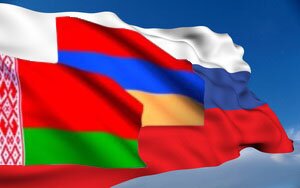
Along with the countries of the European choice — Ukraine, Moldova and Georgia, the participants in the EU “Eastern Partnership” program are also Belarus and Armenia, traditionally focused on Russia. However, despite the chosen priorities and preserved dependence on the Russian Federation, lately both, Belarus and Armenia have been showing a steady trend towards convergence with the EU.
On the one hand reasons for the said are real benefits of European integration, as demonstrated by other countries (including ones of the former USSR), and a significantly greater potential of the EU as trade and economic partner and a financial donor, and on the other hand—negative aspects of the Russian policy in relation to its partners including the consistent denial of their political and economic sovereignty, as well as their subordination to exclusively Russian geopolitical goals and interests.
Besides, an additional factor reducing the attractiveness of Russia for other countries is the deterioration of the Russian economy, exacerbating problems in activities of the Customs Union (CU) and other integration structures of the CIS, which have already proven their being ineffective. In particular, the evidence of this is the reduction in trade between the countries-members of the CU by about 10%, which has occurred since the beginning of this year, as well as ongoing problems in the relationships between the participants of the organization.
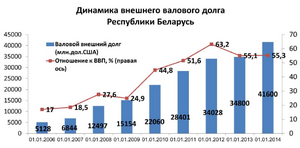 |
|
The dynamics of the gross external debt of the Republic of Belarus http://dengi.onliner.by/ |
In this situation, due to the deepening of relations with the EU, Belarus and Armenia are trying to get opportunities to solve their economic problems, as well as to create a counterweight to pressure from the Russian Federation. This issue is of particular relevance to the Belarusian government, due to permanent deepening of the crisis processes in the Belarusian economy against the background of the forthcoming presidential elections in the country in 2015. In particular, today the total external debt of Belarus is 34.5 billion US dollars (or 53% of the country's GDP), of which this year it is necessary to pay more than 4 billion US dollars. In order to maintain a minimum level of consumption and to pay the accumulated debt, Belarus must annually spend about 1 billion US dollars.
In such circumstances, in order to restore relations with the European Union, which have been stagnating as a result of human rights violations in the country (arrests of opposition leaders), since the beginning of this year the Belarusian government has activated contacts with the EU, including through diplomatic channels through the Netherlands, Belgium, Austria, France, Germany and other countries. Besides, the Government of Belarus has been trying to establish closer relations with individual European countries, in particular, with Lithuania and Latvia.
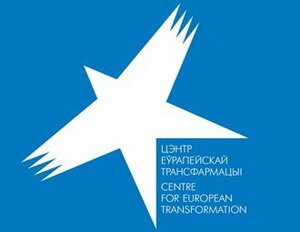 |
|
The ”European dialogue on modernization with Belarus” (EDM), which began in March 2012, is considered mainly as a process of sharing experiences and formulating a vision of the future of Belarus http://naviny.by/ |
Apart from this, of an exemplary character was also the initiative to develop a joint Belarus-EU project “Partnership for Modernization”. This initiative provides for deepening cooperation between the parties in the political, economic and humanitarian spheres, as well as in the field of security, similar to the format of the Russian-European cooperation, which began in 2010.
 |
|
July 4 the Swedish pilot in a small plane having taken off from the territory of Lithuania, dropped on the city of Ivyanets (70 km off Minsk), hundreds of teddy bears, with democratic slogans attached to them. Belarusian military called the scandal with the “landing teddy bears” provocation of foreign intelligence services http://www.ntv.ru/ |
However, Belarus has gone on a number of concessions to the EU both, in foreign and domestic policy. Thus, in April of this year, the Ministry of Foreign Affairs of Belarus renewed accreditation of the Temporary Chargé d' Affaires of Sweden in Minsk. Diplomatic relations between the two countries were severed in August 2012 after a Swedish civilian aircraft had violated the airspace of Belarus and spread propaganda materials against Belarusian authorities (the so-called "landing teddy bears" scandal).
Besides, since the end of July, the leadership of Belarus has released another political prisoner — namely, the ex-presidential candidate V. Neklyayev, sentenced to two years in prison for taking part in a protest on the results of the presidential election in 2011. Earlier, a similar decision was taken about J. Khalip — a journalist, the wife of another former presidential candidate A. Sannikov, who is abroad.
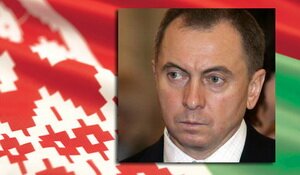 |
|
The EU has suspended a travel ban on Belarusian Foreign Minister Vladimir Makey http://newsradio.com.ua/ |
The above mentioned steps of the Belarusian side cause a positive response and support from the European Union. In Particular, the European Commission has lifted the sanctions against the Belarusian Foreign Minister V. Mackey in order to give him an opportunity to take part in the summit of “Eastern Partnership” of the EU in November. Has also been considered the possibility of lifting sanctions against other representatives of Belarusian authorities, as well as preparation of a plan to promote democratic changes in Belarus, have also been considered.
In its turn, as part of implementation of its interests at post-Soviet territories, the Russian Federation's leadership is trying to prevent a rapprochement between Belarus and the European Union, using all possible pressure on Belarus. First of all, it concerns the role of Russia as a major financial donor and lender of the Belarusian economy.
Thus, to date, the share of the Russian Federation makes 31.5% of the total external debt of Belarus. Meanwhile, Belarus hopes to receive new loans from Russia to modernize its enterprises and to construct nuclear power plants of Russian design. Along with this, Russia actually controls the lending activities of the EurAsEC (the Eurasian Economic Community), which allows it to influence this source of funds for Belarus too.
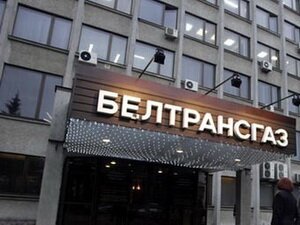 |
|
Company “Beltransgaz”, 100% owned by “Gazprom”, will be renamed “Gazprom Transgaz Belarus” http://www.vestifinance.ru/ |
Besides, despite the efforts of Belarus to diversify sources of energy carriers, Russia has actually preserved its monopoly on oil and gas supplies to Belarus, as well as purchased the gas transport system of the country in the face of the Belarusian state company "Beltransgaz". All this allows Moscow to put pressure on Minsk also by manipulating supply volumes of hydrocarbons to Belarus and prices for them. In particular, against the background of Belarus' attempts to get closer to the EU, at the beginning of August Russia once again reduced its oil supplies to Belarusian consumers.
At the same time Russia is putting pressure on Belarus in other economic spheres, strategically important for the Belarusian side. Thus, in early July, "Uralkaliy", the Russian company, terminated the agreement with the Belarusian company "Belaruskaliy" (the leading enterprise of the Belarusian chemical industry) on joint export of mineral fertilizers, which has undermined the positions of Belarus in this segment of the world market.
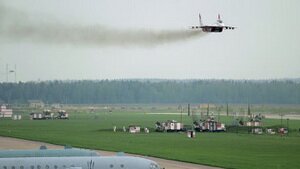 |
|
Russian Defense Minister Sergei Shoigu has stated that Moscow is looking for a suitable airfield for a Russian Air Force base in Belarus http://inosmi.ru/ |
Apart from financial and economic factors, a special way of Russia's actions for keeping Belarus in its sphere of geopolitical influence, is inclusion of the Belarusian side into the system of ensuring Russian military interests in the western strategic direction both, on a bilateral basis and within the framework of the CSTO. In particular, this concerns the creation of joint groups of forces and air defense systems of Russia and Belarus, as well as carrying out, on the initiative of Russia, of joint anti-NATO military trainings. At the same time, under pressure from the Russian side, Russia and Belarus returned to considering the issue of deployment of a Russian air base at the territory of Belarus.
However, despite the strategic nature of relations between the two countries, Russia intensifies outreach efforts on large-scale discrediting the Belarusian leadership. In particular, in the European context — as the “last dictatorship in Europe”, which “cannot have anything to do with the European Union”.

|
|
Map of Republic of Nagornyi Karabakh and Armenia http://nagornykarabakh.livejournal.com/ |
Against the background of complex and contradictory processes in the CIS, also got activated the European component of the foreign policy of Armenia, which is in the most difficult situation among other countries of the former Soviet Union. The cause of the Armenian problem, first of all, is the unresolved conflict between Armenia and Azerbaijan in Nagornyi Karabakh, threatening with the expansion of the armed confrontation between the parties and their escalation into a full-scale war in the South Caucasus, as well as continuation of the blockade of Armenia by Azerbaijan and Turkey.
All this leads to a dominant Armenia's dependence on Russia both, in security and in economic spheres, which in turn gives Moscow powerful leverage over Yerevan, including in terms of establishing control over the Armenian economy, as well as using the country's territory to strengthen the Russian military presence in the region.
 |
|
Russian “Gazprom” can become the sole owner of the Armenian company “ArmRusgazprom” http://www.trend.az/ |
In particular, an example of the use of such a leverage was the increase in the price of Russian gas to Armenia from 316 to 374 U.S. dollars per thousand cubic meters in 2013. At the same time, as a condition of preservation of the previous discounts in the cost of gas, Russia has demanded the transfer into its full ownership of the Armenian state gas company "ArmRosGazprom". The consequence of this was the increase in fuel prices and the accompanying goods and services (including the cost of public transport) in Armenia, which led to aggravation of the socio-political situation in the country, including strikes and mass protests of the population. Along with this, Moscow retains the ability to influence Yerevan also through other sectors of the Armenian economy, owned by Russia, railway transport and systems of mobile communications included.
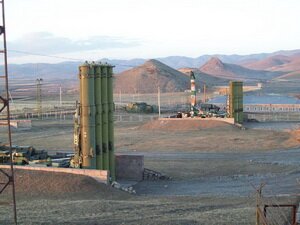 |
|
Military Base 102 in Gyumri, Armenia. Anti-Aircraft Missile Regiment 988. C-300B1 http://forum.openarmenia.com/ |
Besides, under the pretext of “protecting Armenia against Azerbaijan's possible aggression”, Russia takes successive measures for strengthening Base 102 of the Russian Armed Forces at the territory of Armenia with modern Air Defense systems, Attack Missile systems and other types of weapons and military equipment.
Under such circumstances, signing of the Association Agreement with the EU is considered by Armenia as an alternative way to ensure its military security and to create conditions for the development of the country's economy independent from Russia, due to the rapprochement with the EU. Thus, through the association with the European Union, Armenia hopes to reduce the threat of possible military actions on the part of Azerbaijan, which is also engaged in active cooperation with the EU and is not likely to conflict with an associate member of the organization.
In its turn, the conclusion of the Agreement on the establishment of a free trade zone with the European Union will increase the volume of trade with Turkey and Georgia (who have already signed or are planning to sign similar agreements with Brussels), and through them — with other European countries. According to estimates of experts, the mentioned above will lead to revenue growth of the Armenian economy by 146 million Euros per year (2.3% of the country's GDP), including an increase in exports by 15.2% and in imports — by 8.2%.
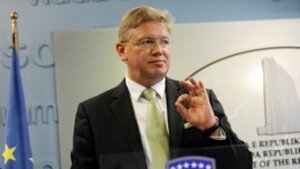 |
|
”Armenia is free to take voluntary decisions,” assured the EU Commissioner for Enlargement and Neighbourhood Policy Stefan Fule, responding to a question about why Armenia should give preference to the Association Agreement with the EU rather than to membership in the initiated by Russia Customs Union http://gdb.rferl.org/ |
As part of implementation of the above mentioned plans, on the 24th of July the European Union and Armenia completed preparatory talks on deep and comprehensive free trade area, which is part of the Association Agreement of the parties. According to the statement of the EU Commissioner for Enlargement and European Neighborhood Policy S. Fule, the agreements will be signed in the course of the summit of “Eastern Partnership” of the EU in Vilnus in November. However, the rapprochement of Armenia and the European Union demands from Yerevan implementation of real democratic reforms in the country.
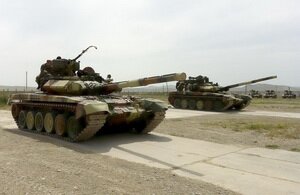 |
|
According to “Gazeta.ru”, citing an unnamed source of “Vedomosti” 's, contracts have been signed for three battalions (94 units) of T-90S tanks, around three battalions (about 100 units) of infantry fighting vehicles BMP-3, one division (18 units) of self-propelled artillery guns “MSTA -S”, one battalion (18 launchers) of multiple launch rocket systems (MLRS) “Smerch”, one Division (18 units) of self-propelled artillery guns “Vena” and one battery (6 units) of heavy flamethrower systems TOS-1A “Solntsepyok” (a new version of “Buratino”). If the information about the configuration of the equipment supplied to Azerbaijan is correct, then it is going to arm at least one combined arms unit (the size of a reinforced brigade to a division) http://topwar.ru/ |
At the same time, as in the case with other countries, the process of European integration of Armenia causes an active reaction of the Russian Federation. In this regard, the main directions of pressure from Moscow to Yerevan are increasing energy prices and artificial aggravation of the situation around Nagornyi Karabakh. In particular, despite the alliance between Russia and Armenia (including the two countries' participation in the Collective Security Treaty Organization), in June Moscow made an openly demonstrative anti-Armenian gesture of giving Azerbaijan heavy offensive weapons worth about 1 billion US dollars. In fact, the above mentioned was Russia's response to Armenia's plans for signing agreements with the European Union.
Against this background, Russia and controlled by it political forces in Armenia are pursuing an active media campaign to discredit the steps of Yerevan to Europe through demonstration of “negative consequences for the country”. First of all, among these effects is being mentioned “a possibility of Armenia's losing control over Nagornyi Karabakh, which it will be forced to transfer to Azerbaijan at the request of the EU”.
Besides, they threat with termination of Russia's giving economic preferences to Armenia (including introduction of a more rigid regime of entry and employment for Armenian labor force at the territory of the Russian Federation), as well as stopping supplying Armenia with arms at discounted prices. In contrast, they keep pushing forward the idea of “appropriate and beneficial for Armenia integration into the Customs Union of Russia, Belarus and Kazakhstan”.
In general, the above mentioned circumstances allow to make a conclusion about a stable trend in the spread of pro-European sentiment in the countries of the CIS, including Russia's closest allies — Belarus and Armenia, as opposed to Eurasian efforts of the Russian Federation. All this clearly shows the weakness and frailty of Russia's integration initiatives at post-Soviet territories, as well as undermines the strategic goals of Moscow to establish its dominant influence at the territories of the former Soviet Union.
In turn, this leads to increased aggressiveness of Moscow's actions to achieve its geopolitical goals, as well as radicalization of positions of Russia, which continues to take all possible measures for pressure on the countries of the CIS, including the possibility of provoking armed conflicts at their territories.

